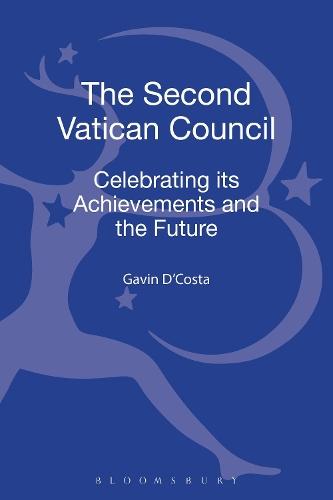Overview
The Second Vatican Council (1963-65) changed the face of modern Catholicism in bringing it into a positive relationship with modern culture. There were significant changes in Catholic thought and practice regarding major topics. This timely and significant book looks at those major issues: revelation, liturgy, the church, ecumenism, world religions, mission, the role of Mary, and the future of the Church. The reader is introduced to the content of Vatican II documents, debates around their interpretation and the manner of their implementation. The essays are written by the leading figures in the Catholic Church and allow the reader to see the Council's impact upon modern Catholicism and engagement with the modern world.
Full Product Details
Author: Dr. Gavin D'Costa ,
Emma Harris
Publisher: Bloomsbury Publishing PLC
Imprint: T.& T.Clark Ltd
Dimensions:
Width: 13.80cm
, Height: 2.00cm
, Length: 21.60cm
Weight: 0.372kg
ISBN: 9780567243003
ISBN 10: 0567243001
Pages: 192
Publication Date: 21 November 2013
Audience:
General/trade
,
General
Format: Hardback
Publisher's Status: Active
Availability: Manufactured on demand

We will order this item for you from a manufactured on demand supplier.
Reviews
If Vatican II is already half a century away, the question of how to remember and interpret it remains alive and kicking in Catholic theology. This collection of essays presents a rich and multi-faceted reflection on what is often deemed the most important religious event of the twentieth century. The volume had its origins in a lecture series in Clifton diocese in Bristol: it offers its readers, as the original lecture series must have offered its audience, not only an enriched and complexifed understanding of the Second Vatican Council, but also something of a tour of the varied sensibilities and concerns at play in Catholic thought today. Karen Kilby, University of Nottingham, UK Why should we care about the Second Vatican Council? As this book reminds us, the answer is not found in tired renditions of long past intra-ecclesiastical manoeuvring, but is because the Council's actual teachings were and are at the service of God's call to each and every human being to enter into friendship with the living Jesus Christ in the communion of his Church. Matthew Levering, University of Dayton, USA This book brings together a range of perspectives on the content and significance of Vatican II. For that veru reason, it is something of a rarity among the many studies of the countil now available. Its determination to do justice to the richness and complecity of the council#s teaching is reflected in the variety of authors assembled here, including those who participated in the council, those charged with implementing it, and those who struggle to do justice to its sometimes quite subtle teaching. Terrence Merrigan, Catholic University of Leuven, Belgium
Through references to historical data and key theological positions the volume establishes the relationship between the documents of the council and the long history of Catholic theological tradition in which the council is embedded. ... This volume's inclusion of diverse voices makes it a good choice for undergraduate, graduate, and general readers who wish to read samples of varied positions. -- Bahar Davary, University of San Diego, USA Horizons If Vatican II is already half a century away, the question of how to remember and interpret it remains alive and kicking in Catholic theology. This collection of essays presents a rich and multi-faceted reflection on what is often deemed the most important religious event of the twentieth century. The volume had its origins in a lecture series in Clifton diocese in Bristol: it offers its readers, as the original lecture series must have offered its audience, not only an enriched and complexifed understanding of the Second Vatican Council, but also something of a tour of the varied sensibilities and concerns at play in Catholic thought today. Karen Kilby, University of Nottingham, UK Why should we care about the Second Vatican Council? As this book reminds us, the answer is not found in tired renditions of long past intra-ecclesiastical manoeuvring, but is because the Council's actual teachings were and are at the service of God's call to each and every human being to enter into friendship with the living Jesus Christ in the communion of his Church. Matthew Levering, University of Dayton, USA This book brings together a range of perspectives on the content and significance of Vatican II. For that veru reason, it is something of a rarity among the many studies of the countil now available. Its determination to do justice to the richness and complecity of the council#s teaching is reflected in the variety of authors assembled here, including those who participated in the council, those charged with implementing it, and those who struggle to do justice to its sometimes quite subtle teaching. Terrence Merrigan, Catholic University of Leuven, Belgium
In his excellent contribution to The Second Vatican Council, Paul Murray makes a crucial distinction between ecumenical optimism and Christian hope. Optimism, he argues, is 'reality-denial,' an assurance that 'things are not really bad as they might seem and will all inevitably work out well,' while hope 'takes reality in all its starkness radically seriously, even into and through death. -- Peter J. Leithart First Things
Author Information
Gavin D'Costa is Professor of Catholic Theology, University of Bristol, UK. Emma Jane Harris is a Theology and Religious Studies graduate of the University of Bristol, UK, and has undertaken research at L’Institut Catholique de Paris, France. Her research interests include postmodern theology, literature and gender issues.




